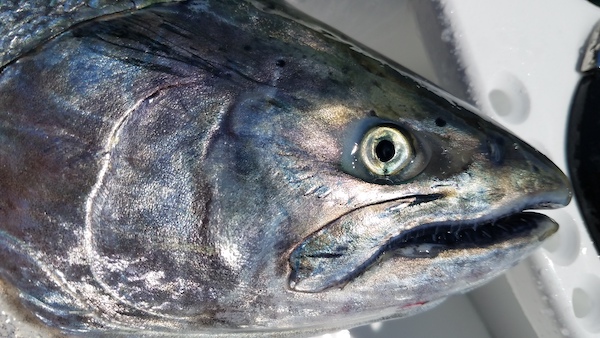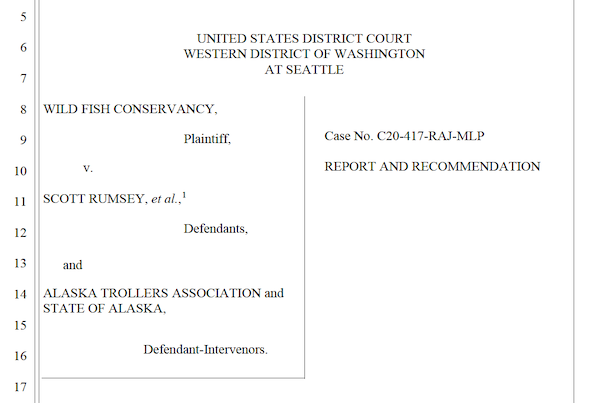
Judge Denies Halt To Prey Increase Program In SE AK Biop Remand
A federal judge this week remanded part of a Southeast Alaska commercial Chinook fishing biological opinion back to the National Marine Fisheries Service to correct, and kept another piece in place.

It was a partial victory for Wild Fish Conservancy, which had sued the feds over their 2019 biop and its Endangered Species Act and National Environmental Policy Act violations, but Magistrate Judge Michelle L. Peterson in Seattle also denied the anti-hatchery organization’s bid to derail a prey increase program meant to help feed starving southern resident killer whales and which along the way will likely benefit Washington salmon anglers.
NMFS has until December 30 to object to the Tuesday recommendation in US District Court for Western Washington. This morning, spokesman Michael Milstein in Portland said that “at this point we are reviewing it and do not have further comment.”
The state of Alaska and Alaska Trollers Association didn’t appear to have an immediate comment. The biop essentially provides them with ESA coverage, given the origin of much of their catch in these cool northern aquatic pastures, in the form of an incidental take statement, or ITS.
The biop in part relied on increased hatchery production in Washington expected to deliver a 4 to 5 percent boost to Chinook numbers at sea, benefiting orcas. While the court took issue with how NMFS implemented that program and WFC wanted it enjoined, or halted until the biop was remedied, however long that took, it since has been fully funded for federal and state hatcheries and more than 19 million Chinook smolts have been released.
“A disruption to the prey increase program, or its funding, thus appears primed to result in gaps in prey abundance that would lead to increased risk to the health of the SRKW and threaten any future operation of the program,” Judge Peterson wrote in her 40-page recommendation.
She said that vacating the program would constitute a “considerable setback to any future resumption of the program while NMFS attempts to cure the ESA and NEPA violations” with the overarching biop, and it would likely also impact fisheries in Northwest waters.
“The prey increase program serves as the environmental baseline for other Puget Sound and [Pacific Fishery Management Council] salmon fishery BiOps and Pacific Northwest FMPs, which rely on the program to stay above a Chinook salmon abundance threshold to limit the effects the fisheries have on the SRKW,” Peterson added.

Still, WFC crowed that her recommendation amounted to a “massive international and coast-wide decision” and a “landmark opinion … that recommends terminating unsustainable commercial salmon harvest that has persisted for decades until new environmental reviews of those fisheries occur. That overfishing was found in a previous ruling to illegally harm the recovery of both endangered Southern Resident killer whales and wild Chinook salmon across the Pacific Northwest.”
In August, when a district court judge indicated the court was likely to rule in favor of WFC and asked for potential fixes from all parties, the state of Alaska said, “The best-case scenario would be for the court to give NMFS time to rework their flawed BiOp without vacating the current incidental take coverage. This would allow fisheries to continue while NMFS corrects its mistakes. The worst-case scenario is that the incidental take coverage is determined to be flawed and Alaska loses its ability to prosecute its Treaty salmon fisheries until a new BiOp is prepared.”
Theoretically and depending on how long it takes NMFS to tweak the biop, this week’s decision would deal Southeast Alaska ports, communities and commercial fishermen a heavy economic blow, while potentially benefiting Lower 48 and Canadian anglers.
WFC and The Conservation Angler have also sued WDFW in state court over Washington’s Orca Prey Initiative, meant to increase salmon availability for SRKWs and provide shirttail benefits to fishermen.

